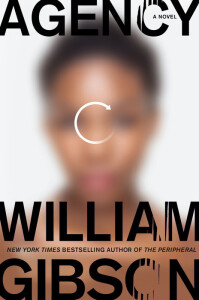 The protagonist of Agency is Verity. She’s a San Francisco-based evaluator of artificial intelligence, hired to test a new product.
The protagonist of Agency is Verity. She’s a San Francisco-based evaluator of artificial intelligence, hired to test a new product.
The subject and hero of Agency is Eunice, the product. Verity is supposed to be conducting a sort of Turing Test on Eunice. But Eunice doesn’t want to be a product owned by the criminals who developed her, and enlists Verity to help her remain free. They go on the lam from the company that hired Verity, calling on Eunice’s growing skillset and Verity’s small but powerful personal network.
The theme of Agency is agency. Which Merriam Webster helpfully defines as “the capacity, condition, or state of acting or of exerting power; a person or thing through which power is exerted or an end is achieved; an establishment engaged in doing business for another.” Eunice briefly has agency and seeks to maintain it. Verity exerts agency on her behalf. And a handful of characters spread across the world and at least three different timelines that branched out from “our” world as it was in 2017, act as an agency to protect Verity, Eunice, and incidentally their own tenuously maintained post-apocalyptic society based in 22nd century London.
The trouble with Agency is that I could hardly bear to put it down. From the moment Verity opens up Eunice’s box and puts on the glasses that are her interface, this book is a wild ride through time and space and exciting, terrifying ideas and events. It’s scary and funny, hip and homely, depressing and at least a little bit hopeful.
It’s the second book in yet another trilogy by Gibson, the septuaginarian North American who since the 1980s has made a career of writing plausible tomorrows by looking hard at today. This one picks up sometime after the action in The Peripheral. The gist of these tales, as it continues to emerge in Agency, is that the world’s political, social, and climate upheavals that we see happening around us today culminated in a catastrophe they now call The Jackpot (in one of these timelines), which led to the extinction of three-quarters of the world’s human population and at least that much of its other animal life. China had the money and tech to go into hiding. The Russian (and other former Soviet sphere) oligarchs now run what’s left, but are kept in check by a mysterious cyber-based power known as The Aunties and the handful of humans they work with. Information tech has continued to progress, to the point that somebody figured out how to reach into the past and meddle with history, but only as far back as briefly pre-Jackpot. Our time, in other words.
In a late 2019 profile in The New Yorker, Gibson said he was well along with the sequel to The Peripheral when Brexit and the 2016 American presidential election shocked him into a massive rewrite. He also talks about it in an interview/reading on The New Yorker‘s podcast. The result is a book that feels even more torn from today’s headlines than usual: “Lock her up” grafitti in an alleyway, tensions ratcheting up around the world, even a mention of pandemics, although this was published just as our current one was beginning.
Gibson’s prose is maybe even a little more hard-boiled than usual, although what violence there is mostly takes place off-stage, and Eunice herself brings a non-violent ethos to the tale. At times it gets a bit hard to follow just who is who and where and when, but Gibson’s fans have learned they can sometimes skim over little details and not lose the larger thread of the story. Huge ideas are at play, offset by plenty of Gibson’s trademark surface detail: San Francisco and London neighborhood names reeled off quickly, fashion designers invoked, technology from motorcycles and cars to tiny camera drones briefly but lovingly described, coffees, teas and artisan buns hungrily consumed. The whole thing left me breathless, and breathlessly awaiting the final installment.
(Berkley, 2020)
